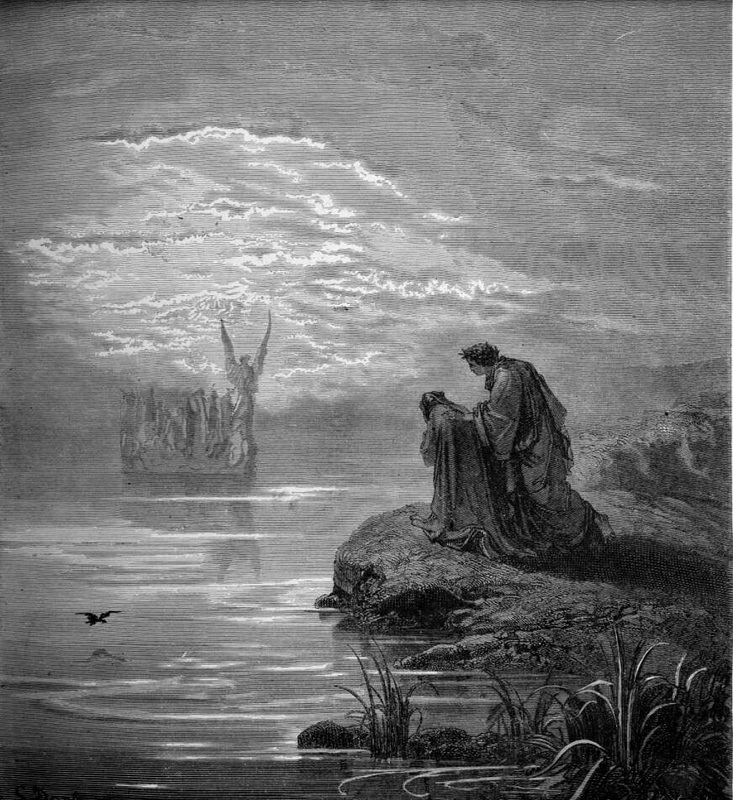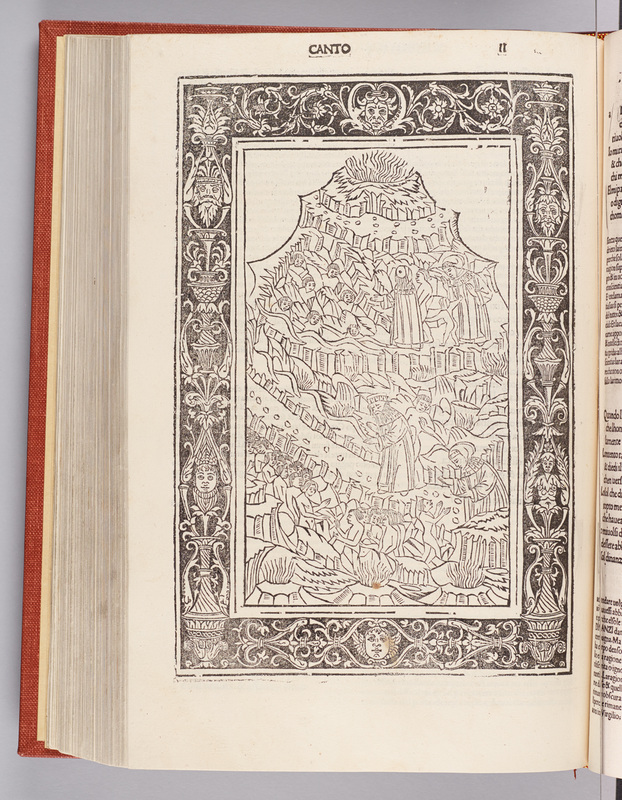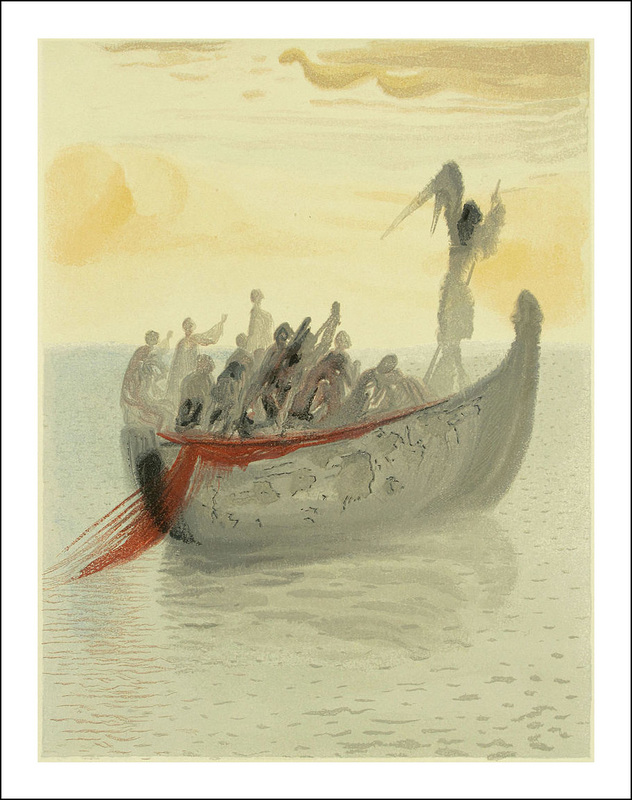Dante the Poet begins this Canto with an elaborate excursus into how to tell the time by the fact that the sun has risen in certain areas of the sky in the Southern Hemisphere which means it has left other constellations behind. Suffice to say, the light is getting brighter here. John Ciardi calls these nine lines “erudite affectation” and I find it hard to disagree with him at one level. Yet, here at the base of Mount Purgatory, we NEED to be reminded of the movement of spheres which mark the passage of time. Every second spent on the Mount that is not used to move closer to God is a second wasted. Indeed, we find that some of the pilgrims have been waiting for months to come here and others will be forced to wait far longer due to their sloth and laziness on earth. The question ‘What Time Is It?’ is far more important than merely deciding in which quadrant the sun is to be found. It is an existential question that aligns one appropriate action to one’s circumstances. Is it time to play? Is it time to sing songs? Is it time to move one’s backside and to get busy unpacking past sins in order to be worthy for future joys and grace? I think again and again we are given the answer to the question “What Time Is It?” in powerful ways here in the Purgatorio.
It is one of the joys in rereading the Commedia to compare parallel events and cantos across all three sections: Inferno, Purgatorio and Paradiso. For instance the crossing over by the pilgrims is remarkably instructive between Inferno and Purgatorio. The ferryman of Hell is Charon, who must whack sinners with the oar to get them in line. The boatman in Purgatorio is an angel who has no need of oars. The people in the Inferno crossing are all about only themselves and it is a raucous turmoil with pushing and shoving each other to see who can get on first. Here we have unity, patience and consideration. In Hell, community is riven and destroyed. In Purgatorio, community is restored. Indeed, we will see this relational concern time and again. The shared singing of Psalm 113 is a clear example of that: they sing with ONE VOICE and as we shall see, the choice of the great hymn is instructive as well.
43 At the stern stood the heavenly pilot--
44 his mere description would bring to bliss.
45 And more than a hundred souls were with him.
46 'In exitu Isräel de Aegypto'
47 they sang together with one voice,
48 and went on, singing the entire psalm.
49 Then he blessed them with the sign of Holy Cross.
50 They flung themselves upon the beach,
51 and he went off as swiftly as he came.
The beauty of the angelic boatman is obvious and the use of greater and greater light revealing the power and presence of the Holy God will be a repeating theme as we move closer to the throne of God in the next two sections: Purgatorio and Paradiso. Dante the Poet’s craft is seen in the gradual revelation of the oncoming boat, which of course, is also a metaphor of gradual revelation of God’s Truth to Dante the Pilgrim on this journey.
We are reminded of the sinfulness of the Dante the Pilgrim here, and it is a wonderfully sly and, in fact, wise dig by Dante the Poet of his own ego and pride. When the dear friend Casella appears and is recognized, Dante the Pilgrim asks him to sing a song like in the old days.
106 And I: 'If a new law does not take from you
107 memory or practice of the songs of love
108 that used to soothe my every sorrow,
109 'please let me hear one now to ease my soul,
110 for it is out of breath and spent,
111 joined to my body coming here.'
112 'Love that converses with me in my mind,'
113 he then began, so sweetly
114 that the sweetness sounds within me still.
As your notes in your translation will remind you, the song he sings in vs 112 is, in fact, one of Dante the Poet’s own poems that had been put to music by Casella. What we have, however, is Dante the Pilgrim stopping everything and subverting the process for which they have all arrived on these shores. Instead of unison singing as one, it is now ONE sing for them all. Instead of moving forward toward the Mount, they now stand still, no progress being made, and only listen. Instead of a holy psalm sung by God’s people, it is a love poem written by one dude who is, in fact, loving the fact that he gets to hear his own work again. There is a real problem in the next three lines, and while Dante the Poet knows this is not right, Dante the Pilgrim does not:
115 My master and I and all those standing
116 near Casella seemed untroubled,
117 as if we had no other care.
118 We were spellbound, listening to his notes…
The psalm they were singing began 'In exitu Isräel de Aegypto' which is “When Israel out of Egypt came.” And yet, just as the exiles from Egypt brought their own means of idolatry with them in the form of jewelry and gold, which ended up being cast into a golden calf to be worshiped, so too these pilgrims and even Virgil and Dante the Pilgrim are on the edge of idolatry themselves with the ‘golden’ poetry of their past lives on earth. They have supplanted the worship of the One God with the self-referent adulation of one man’s love poem sung by another man. They are spellbound. It is a form of a golden calf of their own making. Now, here in Purgatory, they are not growing, moving and mourning their sins which prevent them from seeing God’s light. There is a real lesson here for me, in that simply because something might make me happy or enable me to be “untroubled,” it is not necessarily the best thing for me. We are in the realm of intention and integrity which requires sacrifice and surrender: a very difficult place to walk for some of us.
Cato knows this and, like Moses coming down from the Mount in Exodus, this fiercely righteous man rushes up and sends everyone fleeing toward that which should have been foremost on their hearts as soon as they set foot on shore: growth in God.
119 … that venerable old man appeared and cried:
120 'What is this, laggard spirits?
121 'What carelessness, what delay is this?
122 Hurry to the mountain and there shed the slough
123 that lets not God be known to you.'
Who, I wonder, will be that strong presence in our lives, in my life, when in fact I sit ‘untroubled,’ smiling, stupidly ‘spellbound’ and neglecting what is required of me by my God?



 RSS Feed
RSS Feed
